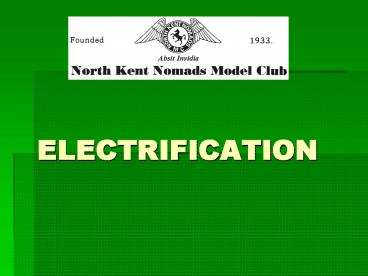ELECTRIFICATION PowerPoint PPT Presentation
1 / 23
Title: ELECTRIFICATION
1
ELECTRIFICATION
2
ELECTRIFICATION
- Introduction
- Basics of electric motors
- Brushed motors, Brushless Out Runner motors
- Motor Constants
- Choosing a Motor with makers data
- Interpreting makers data
- Rules of thumb are just that and not theoretical
- Summary
- Useful Web sites
3
The Coil
Magnetic field of a wire
4
The Coil
- One loop's magnetic field
5
The Coil
- A simple electromagnet
6
An Electric Motor
- Electromagnet in a horseshoe magnet
7
An Electric Motor
- Parts of an electric motor
8
An Electric Motor
- The commutator and coils rotates between two
magnets. This is a three pole motor
9
Brushless Outrunner Motor
By Torcman
- The coils are stationary the casing for the
magnets around the periphery rotates.
10
Brushless Outrunner Motor
- Torcman Motor 14 magnets 14 Poles
- Magnetic field goes around 7 times for 1
rev of Outrunner - Outrunner type motors have more torque than
same size brushed motor
11
Electromechanical motor constants
- The geometric arrangement of the magnetic circuit
and winding defines in detail how the motor
converts the electrical input power (current,
voltage) into mechanical output power (speed,
torque). Two important characteristic values of
this energy conversion are the speed constant kn
and the torque constant kM. - The speed constant combines the speed n (rpm)
with the voltage induced in the winding Uind
(Volt). Uind is proportional to the speed the
following applies - n kn . Uind
- Similarly, the torque constant links the
mechanical torque M (Newton) with the - electrical current I (Amp).
- M kM . I
- The speed and torque constant are not
independent. The following applies - kn . kM 60 / 2p
- Efficiency Output power / Input power hence
- ? 2p/60 . n . M / U . I
12
Electromechanical motor constants
Power balance Pin Ploss Pmech U.I R.I2
M.n.2p/60 RResistance U.M/km
R.(M/km)2 M.n.2p/60 N U. 60/ 2p.km.
R.M.60/2p.km2 But kn . km 60 / 2p
- In the speed-torque diagram, the output power is
equivalent to the area of the rectangle below the
speed-torque line. This rectangle and, thus, the
output power, is greatest at half stall torque
and half no-load speed.
13
Choosing A Motor
- RULE OF THUMB
! Max Rivers who distributes Torcman suggests
twice as much power !
14
Choosing A Motor
- If the model weighs 300 g and you want it to be
3D capable we need gt 52 Watt. - That determines the size of motor a little bigger
is a good idea say 60 Watt. - How many cells will determine the voltage.
- Choose a propeller to absorb the power.
- Remember Watts Volts X Amps
- Choose the speed controller to suit with the
current - Big propellers turn slower. Look for a lower kv
in the same motor size. - Lower kv means more turns or windings.
- Ducted fans want high RPM so less turns are
wanted - AXI give very useful data
15
Choosing A Motor
- This data is for the 2208/34
Notice how the voltage is not consistent, the
volt drop in the battery increases with current
drain.
16
Useful Information or not?
- Thrust data is for the static condition, because
of drag and wind speed, model shape, it is
possibly only of interest for prop hanging
indoors
17
Choosing A Motor
If model weighs 300 g this data tells us the
motor should work, but we cannot tell much more
without using maths! kn is given presumably at
no load. Using the formula we can predict the
speed at any torque and the power (M.n P
watts). Of course we still need to know what
power is needed for a given propeller.
18
Choosing A Motor
- So we know the voltage, the power, the rpm a
motor will deliver now we need some propeller
data. If everything matches that is the motor to
buy! - Another rule of thumb for 69 inch propellers-
- U volt constant then 1 inch less diameter reduces
power by 25, RPM goes up 5, thrust is down 40
. The converse is true for 1 inch bigger
diameter. - 1 inch less pitch reduce power by 10 at same
RPM.
19
Choosing A Motor
- Warning about - Rule of thumb
- Do not blame me! They are inaccurate!
- The idea is to get a handle on how things relate
to one another.
20
Choosing A Motor
This data was derived theoretically using the
relationship that power and rpm are connected by
a 3v
21
Electrification Summary
- Brushless motors are more efficient and more
powerful than the same size brushed motor. - Brushless Motors are different not necessarily
better, it depends on what you want. - More turns means less speed and more torque.
- If you copy someone else make sure they tell you
exactly what they have, look at the specs and
confirm.
22
Electrification Summary
- If you go your own way
- Estimate the model weight.
- Decide how you would like it to fly.
- Match the motor to the power needed.
- Decide on battery type
- Pick a propeller to absorb the power.
23
Web Sites
- www.megamotor.cz/en/novinky.phtml
- www.kb-modell.de
- www.modelmotors.cz/index.php?idenncdomu
- http//www.torcman.de/index.htm

